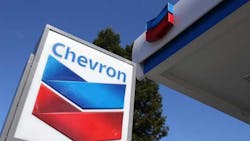Chevron Alleges Ecuador Fraud in Oil Pollution Case
NEW YORK -- Chevron claimed Ecuador used fraud to win an Ecuadoran pollution case against it, in final arguments at a trial today in a New York federal court.
Chevron (IW 500/2) is fighting an Ecuadoran regional court ruling in 2011 ordering it to pay a $9 billion fine for environmental damage to the Amazon when the U.S. oil company Texaco operated in Ecuador between 1964 and 1990.
The fine, later increased to $19 billion, was reduced by Ecuador's Supreme Court to $9.51 billion on Nov. 12.
Chevron has never worked directly in Ecuador but inherited the pollution lawsuit when it acquired former rival Texaco in 2001.
Chevron maintains that Ecuador and its state oil company Petroecuador are to blame for the damages.
In closing arguments in the U.S. District Court in New York, Chevron alleged fraud and violations under the Racketeer Influenced and Corrupt Organizations Act in the handling of the lawsuit in Ecuador.
"It was a scheme so audacious, so bold it would make a Mafia boss blush," argued Randy Mastro, a lawyer for Chevron. "But Chevron didn't give in and that's why Chevron is here to get justice."
Mastro outlined an elaborate scheme alleging that plaintiffs attorneys, led by controversial New York attorney Steven Donziger, conspired to use fraud and bribery to win a huge 2011 judgment in Ecuador against Texaco over environmental damage in the rainforest.
Mastro's charges included that Donziger and allies ghostwrote a report assessing the scale of the environmental damage that was supposed to be led by independent consultant Richard Cabrera. Other allegations said Donziger and allies bribed Ecuadoran judges to win the 2011 ruling and ghost wrote parts of the ruling.
Defense Denies Allegations
Defense attorneys denied that Donziger and Ecuadoran plaintiffs had bribed Ecuadoran judges in the case, or ghost wrote the $19 billion ruling. Donziger has acknowledged that his side ghostwrote the Cabrera report, but argues that its behavior was not illegal in Ecuador, where there is a different standard in determining the independence of experts.
The New York case is the latest in years of litigation over pollution attributed to Texaco Petroleum. Chevron has almost no assets in Ecuador.
Thousands of villagers in the polluted area say they were sickened and many have cancer from the contamination of their water supply from oil spillage.
Lawyers representing the defendants slammed the trial as a sideshow intended to drag out litigation and evade payment for environmental damages. They have criticized the U.S. judge for accepting the case in the first place, which they said inappropriately overreaches U.S. authority over foreign courts.
"Ultimately, what Chevron is asking you to do is to extend the reach of common law to the far reaches of the globe," said Richard Friedman, an attorney leading the fight against Chevron.
The case could have implications for lawsuits in Canada and Brazil, where the plaintiffs are going after Chevron's assets.
Julio Gomez, an attorney representing some of the Ecuadoran plaintiffs who were named in Chevron's case, said his defendants have been harmed by having to travel a great distance and by the inability of other corroborating witnesses to participate in the litigation.
"My clients have appeared in this case under protest and they believe they are not under this court's jurisdiction," Gomez said. "How wise or just is it for this court to exercise jurisdiction over the Ecuadoran defendants? How wise or just is it to judge the impartiality of the Ecuadorian legal system?"
Last week, Ecuador's president, Rafael Correa, promised to resign if Chevron proved his government interfered in the Ecuadoran trial.
Copyright Agence France-Presse, 2013
About the Author
Agence France-Presse
Copyright Agence France-Presse, 2002-2025. AFP text, photos, graphics and logos shall not be reproduced, published, broadcast, rewritten for broadcast or publication or redistributed directly or indirectly in any medium. AFP shall not be held liable for any delays, inaccuracies, errors or omissions in any AFP content, or for any actions taken in consequence.
